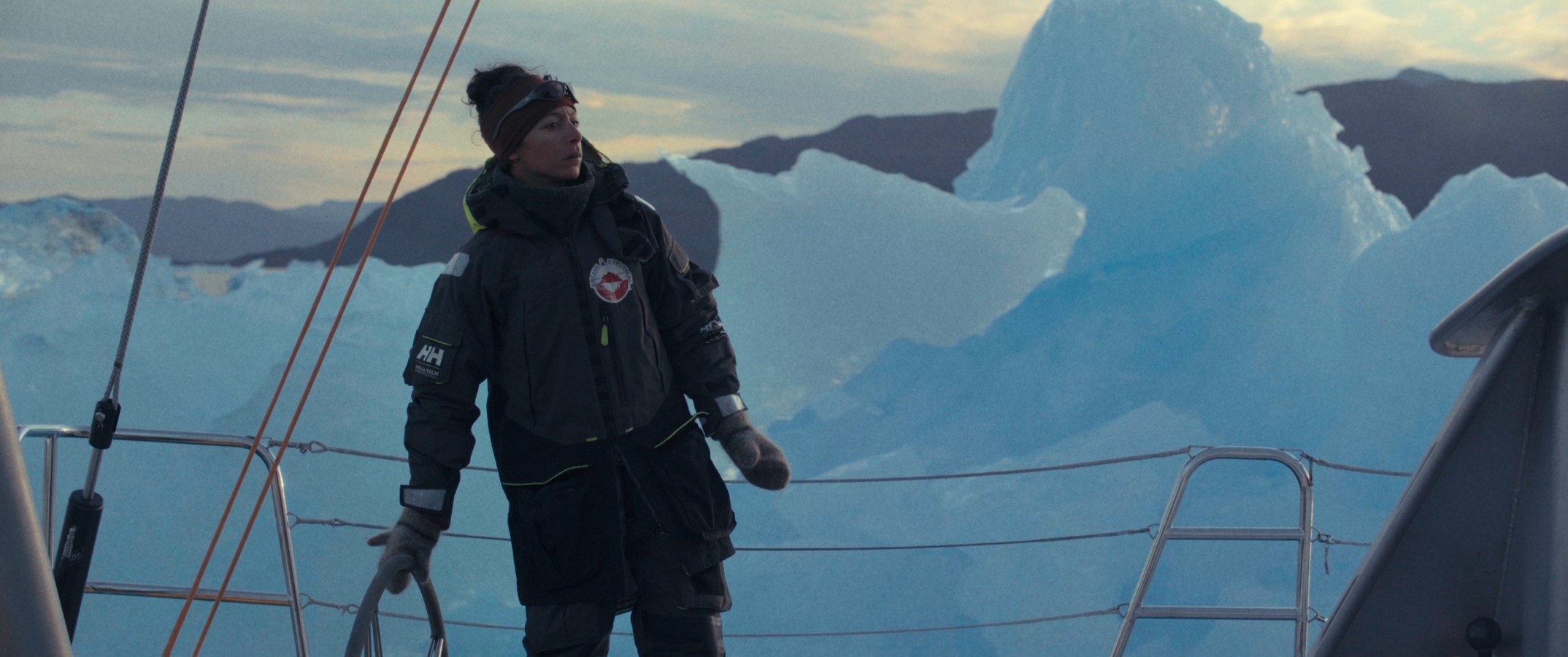
À PROPOS DE POLARIS
Polaris fait d'emblée un pari de cinéma. Du brouillard d'une tempête du grand nord émerge une apparition que nous prenons d'abord pour un mirage : la petite silhouette surgie du néant se rapproche de nous, avançant à grand peine contre les éléments déchaînés. Ce premier plan annonce le mouvement du film, embrassant la trajectoire de son personnage principal, Hayat. Polaris nous embarque avec elle dans un voyage glaciaire, accompagné par un remarquable travail du son, et dont la beauté austère entre en résonance avec sa lutte intérieure.
Femme capitaine, marin qui navigue aux confins du monde, Hayat est magnifique. Espérant se construire une vie en dépit d'une histoire familiale maudite, elle a choisi de partir. La réalisatrice met en scène l'attachement avec celle qui est restée, sa sœur Leila, tendant leur lien par delà les océans. Tandis que l'une navigue, répétant sans cesse le mouvement d'un départ vers le large, l'autre met au monde un enfant. Chacune à sa manière conjure une prédiction d'abandon.
En parcourant des territoires qui deviennent l'ailleurs l'un de l'autre, le film travaille la géographie et notre place dans le monde, celle qui nous est assignée et celle que l'on se choisit. Sur un mode burlesque, lorsqu'Hayat disparaît dans le moteur d'un bateau qu'elle répare, épique lorsqu'elle est sur le pont, barrant entre les blocs de glace, enveloppée dans un silence abyssal.
Avec elle, la réalisatrice Ainara Vera parvient à incarner une forme d'héroïsme qui convoque notre imaginaire. Et ce geste de cinéma fait écho à une question autrement humaine : arriver à vivre heureux en dépit du sentiment d'être l'enfant de personne.
Right from the start, Polaris is a cinematic gamble. From a stormy fog in the Great North emerges a figure that we first take as a mirage. The small silhouette that comes out from the void slowly walks towards us, fighting its way against the turmoil of the forces of nature. This first scene foreshadows the global movement of the movie, which embraces the trajectory of its main protagonist, Hayat. Polaris invites us to accompany her in her glacial journey. Supported by a remarkable work on sound, the movie's stark beauty resonates with her inner struggle.
A truly magnificent character, Hayat is a ship captain who sails away to the confines of the world. In spite of a doomed family story, she aspires to build a new life for herself, and that is the reason why she chose to leave. The filmmaker documents Hayat's attachment to the one who stayed behind, her sister Leila, and she shows us how they stay connected across the oceans. While the former repeatedly leaves the land to go towards the open sea, the latter gives birth to a child. Thus, each of the two sisters finds her own way to avert the predictions of abandonment.
By exploring very dissimilar territories, the movie works on geography and on the place each of us has in the world - the place that was assigned to us and the one that we choose for ourselves. Sometimes it does so with a slapstick humor, as when Hayat entirely disappears in the engine of the ship she is repairing. Other times it gets epic, like in the scene in which she is on the deck, surrounded by an abyssal silence, and she steers between the blocks of ice.
With Hayat, filmmaker Ainara Vera, has found a woman who embodies a form of heroism which summons our imagination. And her movie echoes a highly human question : how can an individual manage to be happy despite feeling they are nobody's child ?
Publié le mardi 26 avril 2022


